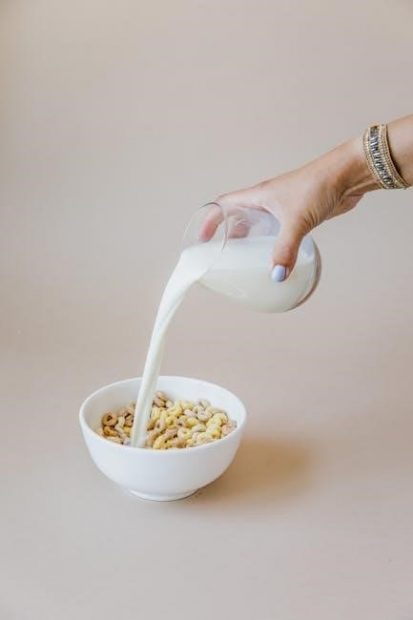Non-dairy calcium-rich foods provide essential nutrients for bone health without relying on dairy products‚ offering versatile options like fortified plant milks‚ leafy greens‚ and seeds for diverse diets.
Understanding the Importance of Calcium in the Diet
Calcium is a critical mineral for building and maintaining strong bones and teeth‚ as well as supporting muscle and nerve function. It plays a vital role in blood clotting and heart health. Adequate calcium intake is essential throughout life to prevent conditions like osteoporosis and fractures. Without sufficient calcium‚ the body may draw it from bones‚ leading to weakened bone density over time. Ensuring a diet rich in calcium helps maintain overall health and reduces the risk of chronic diseases associated with calcium deficiency.
Why Choose Non-Dairy Sources of Calcium?
Non-dairy calcium sources are ideal for individuals with lactose intolerance‚ dietary preferences‚ or ethical reasons. They offer a versatile alternative to traditional dairy products while providing essential nutrients. Many non-dairy options like fortified plant milks‚ leafy greens‚ and seeds are rich in calcium and other vital minerals. This makes them a great choice for maintaining bone health without relying on dairy. With a wide variety of non-dairy foods available‚ it’s easier than ever to meet daily calcium needs and support overall wellness in a way that suits every lifestyle and preference.

Fortified Foods as a Source of Calcium
Fortified foods like plant-based milks and cereals are excellent non-dairy sources of calcium‚ offering convenient and nutritious alternatives to traditional dairy products.
Calcium-Fortified Plant-Based Milks
Calcium-fortified plant-based milks‚ such as almond‚ soy‚ oat‚ and rice milk‚ are excellent non-dairy sources of calcium. These milks are often enriched with calcium to levels comparable to dairy milk‚ making them a great alternative for those avoiding dairy. A single cup typically provides around 300-450 mg of calcium‚ depending on the brand and fortification level. Pairing these milks with vitamin D-fortified options can further enhance calcium absorption‚ supporting strong bone health. Always check labels to ensure adequate calcium content‚ as fortification levels can vary.
Calcium-Enriched Cereals and Bread
Calcium-enriched cereals and bread are convenient non-dairy sources of calcium‚ ideal for breakfast or snacks. Many brands fortify their products with calcium‚ making them excellent options for those avoiding dairy. These foods are often enriched with other nutrients like vitamin D‚ which enhances calcium absorption. whole-grain bread and breakfast cereals are popular choices‚ providing a significant portion of daily calcium needs. They are also suitable for vegans and individuals with lactose intolerance‚ offering a delicious and easy way to maintain bone health without relying on dairy products. Always check labels for calcium content.

Vegetables Rich in Calcium
Leafy greens‚ broccoli‚ and Chinese cabbage are excellent non-dairy calcium sources. These vegetables are versatile‚ nutrient-dense‚ and support bone health without the need for dairy products.
Leafy Greens: Kale‚ Broccoli‚ and Bok Choy
Kale‚ broccoli‚ and bok choy are among the richest non-dairy sources of calcium. One cup of cooked kale provides approximately 200 mg of calcium‚ while broccoli offers about 250 mg per serving. Bok choy is another excellent option‚ delivering 160 mg of calcium in just 100 grams. These leafy greens are also packed with vitamins A‚ C‚ and K‚ and fiber‚ making them a nutrient-dense choice for supporting bone health and overall wellness. Incorporating them into meals ensures a strong‚ dairy-free calcium intake.
Other Vegetables: Chinese Cabbage and Cooked Broccoli
Chinese cabbage and cooked broccoli are excellent non-dairy calcium sources. Chinese cabbage provides about 239 mg of calcium per 100 grams‚ while cooked broccoli offers approximately 250 mg per cup. These vegetables are also rich in vitamins A‚ C‚ and K‚ and fiber‚ enhancing overall nutrition. Cooking broccoli increases calcium bioavailability‚ making it a practical choice for bone health. Incorporating these vegetables into meals ensures a steady supply of calcium without dairy‚ supporting strong bones and a balanced diet.
Seeds and Nuts as Non-Dairy Calcium Sources
Seeds like chia‚ sesame‚ and poppy‚ along with nuts such as almonds‚ are nutrient-rich‚ offering high calcium content and supporting bone health in plant-based diets.
Chia Seeds‚ Sesame Seeds‚ and Almonds
Chia seeds‚ sesame seeds‚ and almonds are excellent non-dairy sources of calcium. Chia seeds are rich in omega-3 fatty acids and provide approximately 63 mg of calcium per ounce. Sesame seeds are highly concentrated‚ offering 88 mg per tablespoon‚ making them a versatile addition to dishes. Almonds are another great option‚ with a 1-ounce serving delivering about 80 mg of calcium. These nutrient-dense foods support bone health and are ideal for plant-based diets‚ offering additional benefits like fiber‚ vitamins‚ and minerals beyond calcium.
Other Nutritious Options: Sunflower Seeds and Poppy Seeds
Sunflower seeds and poppy seeds are nutritious non-dairy sources of calcium‚ offering additional health benefits. Sunflower seeds provide about 66 mg of calcium per 1/4 cup‚ along with vitamin E and magnesium. Poppy seeds are even richer‚ delivering 1‚438 mg per 100 grams‚ making them one of the highest non-dairy calcium sources. Both seeds are versatile‚ adding texture and flavor to dishes like salads‚ baked goods‚ and smoothies. They also offer antioxidants‚ fiber‚ and healthy fats‚ making them excellent choices for enhancing bone health and overall nutrition in plant-based diets.
Legumes and Protein Sources
Legumes and protein sources offer rich non-dairy calcium options‚ including beans‚ lentils‚ and tofu‚ providing essential nutrients for bone health and balanced nutrition.
Beans and Lentils: High in Calcium and Fiber
Beans and lentils are excellent non-dairy sources of calcium and fiber‚ supporting bone health and digestion. White beans‚ chickpeas‚ and lentils are particularly rich in calcium‚ with a single serving providing significant nutritional benefits. These legumes are versatile‚ easily incorporated into meals like soups‚ salads‚ and stews. Pairing them with vitamin D-rich foods enhances calcium absorption‚ while their high fiber content promotes gut health. Incorporating beans and lentils into your diet is a simple way to maintain strong bones and overall wellness without relying on dairy products.
Tofu and Soy Products: Versatile and Nutritious
Tofu and soy products are excellent non-dairy sources of calcium‚ offering versatility and nutrition. Tofu‚ especially when calcium-set‚ is rich in calcium and protein‚ making it ideal for stir-fries‚ curries‚ and salads. Edamame‚ tempeh‚ and miso are other soy-based options that provide calcium and additional nutrients like iron and probiotics. These foods are easily incorporated into various cuisines‚ supporting bone health and overall wellness without dairy. Their adaptability makes them a great choice for diverse dietary needs‚ ensuring a balanced intake of essential nutrients.

Fish and Seafood Options
Fatty fish like sardines and salmon are rich in calcium and omega-3 fatty acids‚ making them excellent non-dairy choices for promoting bone and heart health effectively.
Sardines and Salmon: Calcium-Rich and Packed with Omega-3
Sardines and salmon are exceptional non-dairy sources of calcium‚ particularly when consumed with their edible bones. They are also rich in omega-3 fatty acids‚ which support heart health and reduce inflammation. Sardines are especially calcium-dense‚ making them a great option for those avoiding dairy. Salmon offers additional benefits‚ including vitamin D‚ which enhances calcium absorption. Incorporating these fish into meals‚ whether canned or fresh‚ provides a nutritious and flavorful way to boost bone and overall health naturally.

Maximizing Calcium Absorption
Maximizing calcium absorption requires pairing calcium-rich foods with Vitamin D‚ proper cooking techniques‚ and balanced meals. Avoid oxalate-rich foods and ensure adequate sunlight exposure for optimal bone health.
Vitamin D and Calcium Pairing
Vitamin D is essential for enhancing calcium absorption‚ making it a critical pairing for bone health. Non-dairy calcium-rich foods like fortified plant milks often contain added Vitamin D‚ ensuring optimal absorption. Sunlight exposure and certain mushrooms are natural sources of Vitamin D‚ complementing dietary intake. This pairing supports strong bones and teeth without relying on dairy products‚ making it a vital strategy for those seeking plant-based nutrition. Proper absorption ensures that the body effectively utilizes calcium from foods like leafy greens‚ seeds‚ and fortified cereals.
Cooking and Preparing Calcium-Rich Foods
Cooking and preparing calcium-rich foods can enhance their nutritional value. Steaming or roasting vegetables like broccoli and kale preserves calcium content‚ while adding vinegar during cooking can improve absorption. Fortified plant milks and cereals can be incorporated into smoothies or breakfast meals for convenience. Tofu and legumes can be marinated and baked or stir-fried to boost calcium intake. Proper preparation ensures that non-dairy calcium sources remain nutrient-dense and flavorful‚ making them versatile additions to a balanced diet.
Incorporating non-dairy calcium-rich foods into your diet supports bone health and offers diverse‚ lactose-free options. Consult a healthcare professional to personalize your nutritional plan effectively.
Creating a Balanced Diet with Non-Dairy Calcium Sources
A well-rounded diet incorporating non-dairy calcium-rich foods ensures optimal bone health and nutrition. Include fortified plant-based milks‚ leafy greens‚ seeds‚ and legumes in meals and snacks. Pair calcium-rich foods with vitamin D sources‚ like sunlight or fortified cereals‚ to enhance absorption. Rotate food choices to avoid relying on a single source‚ as some plant-based calcium sources may contain oxalates that reduce absorption. Aim to meet daily calcium needs through varied‚ nutrient-dense meals tailored to your dietary preferences and requirements.
Resources for Further Reading and Planning
For detailed guidance on non-dairy calcium-rich foods‚ consult resources like the National Osteoporosis Foundation or the USDA National Nutrient Database. Downloadable charts‚ such as the Calcium Food Chart‚ provide at-a-glance information on dairy and non-dairy options. Visit osteoporosis.foundation for global calcium recommendations. Use meal planners and food value guides to track intake and ensure balanced nutrition. Check food labels for calcium content and explore vegan-friendly resources for tailored advice on plant-based diets;
